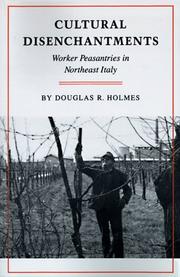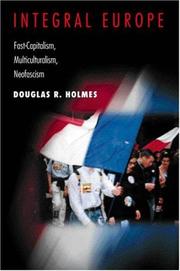| Listing 1 - 9 of 9 |
Sort by
|

ISBN: 0691028494 0691094489 0691225753 Year: 1989 Publisher: Princeton (N.J.) Princeton University Press
Abstract | Keywords | Export | Availability | Bookmark
 Loading...
Loading...Choose an application
- Reference Manager
- EndNote
- RefWorks (Direct export to RefWorks)

ISBN: 9780691050898 0691050899 0691033889 9786613009128 1283009129 1400823889 1400814375 9781400823888 Year: 2010 Publisher: Princeton, NJ
Abstract | Keywords | Export | Availability | Bookmark
 Loading...
Loading...Choose an application
- Reference Manager
- EndNote
- RefWorks (Direct export to RefWorks)
Over the past 15 years, the project of advanced European integration has followed a complex secular and cosmopolitan agenda. As that agenda has evolved, however, so have various hard-line populist movements with goals diametrically opposed to the ideals of a harmonious European Union. Spearheaded by figures such as Jean-Marie Le Pen, the controversial leader of France's National Front party, these radical movements have become increasingly influential and, because of their philosophical affinities with fascism and national socialism--politically worrisome. In Integral Europe, anthropologist Douglas Holmes posits that such movements are philosophically rooted in integralism, a sensibility that, in its most benign form, enables people to maintain their ethnic identity and solidarity within the context of an increasingly pluralistic society. Taken to irrational extremes by people like Le Pen, integralism is being used to inflame people's feelings of alienation and powerlessness, the by-products of impersonal, transnational "fast-capitalism." The consequences are an invidious politics of exclusion that spawns cultural nationalism, racism, and social disorder. The analysis moves from northern Italy to Strasbourg and Brussels, the two venues of the European Parliament, and finally to the East End of London. This multi-sited ethnography provides critical perspective on integralism as a form of intimate cultural practice and a violent idiom of estrangement. It combines a wide-ranging review of modern and historical scholarship with two years of field research that included personal interviews with right-wing activists, among them Le Pen and neo-Nazis in inner London. Fascinating, provocative, and sobering, Integral Europe offers a rare inside look at one of modern Europe's most unsettling political trends.
Fascism --- Multiculturalism --- Political anthropology --- Political culture --- Political socialization --- History --- Europe --- Economic conditions --- Cultural diversity policy --- Cultural pluralism --- Cultural pluralism policy --- Ethnic diversity policy --- Socialization, Political --- Anthropology, Political --- Government, Primitive --- Government policy --- Social policy --- Anti-racism --- Ethnicity --- Cultural fusion --- Political psychology --- Political sociology --- Socialization --- Ethnology --- Political science --- Culture --- Anthropological aspects
Book
ISBN: 9780226087597 9780226087627 Year: 2014 Publisher: Chicago The University Of Chicago Press
Abstract | Keywords | Export | Availability | Bookmark
 Loading...
Loading...Choose an application
- Reference Manager
- EndNote
- RefWorks (Direct export to RefWorks)
Book
ISBN: 9780691225753 Year: 2021 Publisher: Princeton, NJ
Abstract | Keywords | Export | Availability | Bookmark
 Loading...
Loading...Choose an application
- Reference Manager
- EndNote
- RefWorks (Direct export to RefWorks)
Multi
ISBN: 9780691225753 Year: 2021 Publisher: Princeton, N.J. Princeton University Press
Abstract | Keywords | Export | Availability | Bookmark
 Loading...
Loading...Choose an application
- Reference Manager
- EndNote
- RefWorks (Direct export to RefWorks)
Digital
ISBN: 9781400823888 9780691050898 Year: 2010 Publisher: Princeton, N.J. Princeton University Press
Abstract | Keywords | Export | Availability | Bookmark
 Loading...
Loading...Choose an application
- Reference Manager
- EndNote
- RefWorks (Direct export to RefWorks)
Book

ISBN: 9780857455437 Year: 2009 Publisher: New York Oxford
Abstract | Keywords | Export | Availability | Bookmark
 Loading...
Loading...Choose an application
- Reference Manager
- EndNote
- RefWorks (Direct export to RefWorks)
Multi

ISBN: 9780857455437 Year: 2009 Publisher: New York; ; Oxford Berghahn Books
Abstract | Keywords | Export | Availability | Bookmark
 Loading...
Loading...Choose an application
- Reference Manager
- EndNote
- RefWorks (Direct export to RefWorks)
Multi

ISBN: 9781501753374 9781501753367 Year: 2021 Publisher: Ithaca, N.Y. Cornell University Press
Abstract | Keywords | Export | Availability | Bookmark
 Loading...
Loading...Choose an application
- Reference Manager
- EndNote
- RefWorks (Direct export to RefWorks)
As multisited research has become mainstream in anthropology, collaboration has gained new relevance and traction as a critical infrastructure of both fieldwork and theory, enabling more ambitious research designs, forms of communication, and analysis. 'Collaborative Anthropology Today' is the outcome of a 2017 workshop held at the Center for Ethnography, University of California, Irvine. This book is the latest in a trilogy that includes 'Fieldwork Is Not What It Used to Be' and 'Theory Can Be More Than It Used to Be.' Dominic Boyer and George E. Marcus assemble several notable ventures in collaborative anthropology and put them in dialogue with one another as a way of exploring the recent surge of interest in creating new kinds of ethnographic and theoretical partnerships, especially in the domains of art, media, and information.
Social sciences (general) --- Anthropology --- Group work in research. --- Interdisciplinary research. --- Methodology.
| Listing 1 - 9 of 9 |
Sort by
|

 Search
Search Feedback
Feedback About UniCat
About UniCat  Help
Help News
News